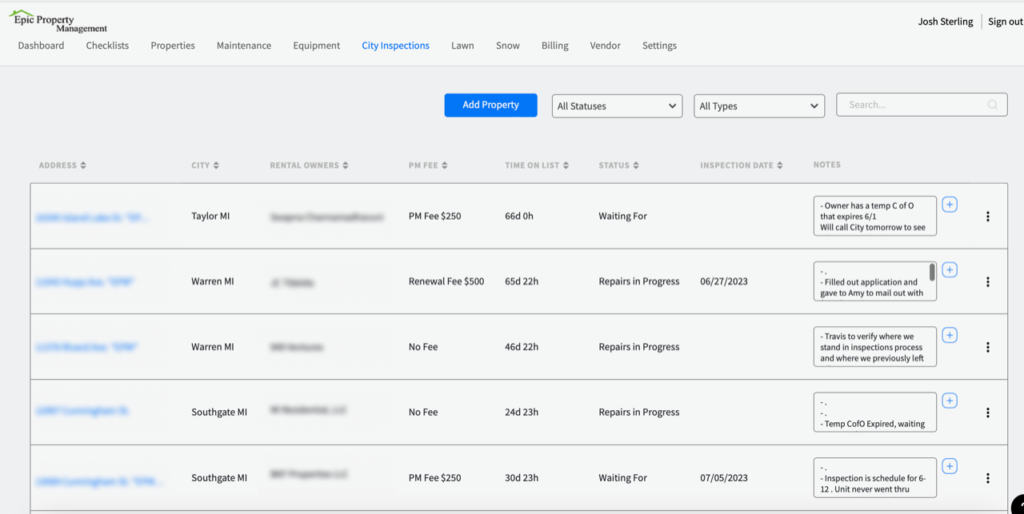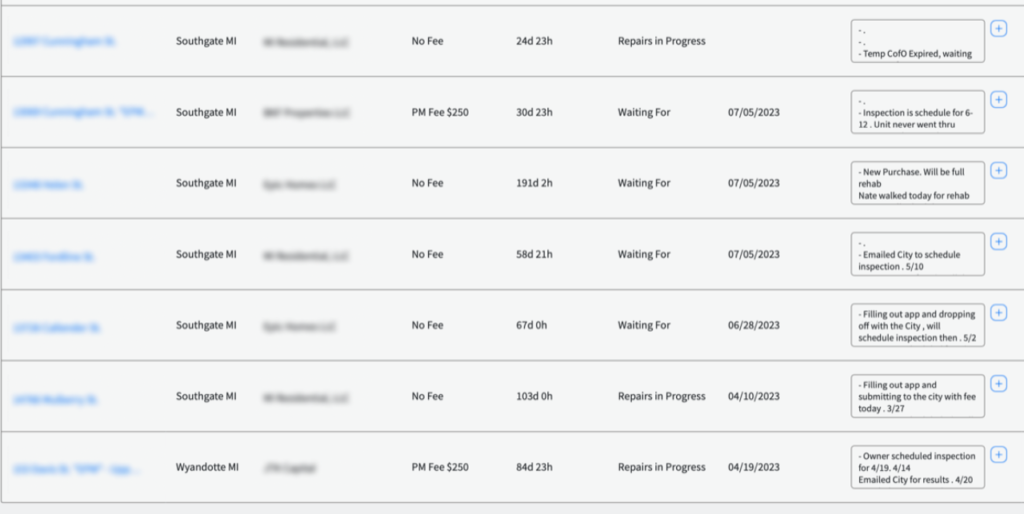If you asked 100 owners what their favorite thing is about real-estate investing, 0% would say managing city inspections for rental properties.
As neissary as they are inconvenient, costly, and time consuming, city inspections can be a headache on many levels. From coordinating with tenants to keeping up with requirements to managing sub-contractors for each trade, it’s a process rife with cumbersome detail.
Based on our data, managing city inspections for a single rental property takes an average of 120 days from start to finish, and the process can range from 15 – 60+ hours of work just for oversight alone, depending on the property’s needs—more if the property manager’s process doesn’t run like a well-oiled machine.
Requirements for City Inspections of Rental Properties
Most city inspections require 4 separate inspections:
- Electrical
- Plumbing
- HVAC
- General building
But don’t be deceived by the short list.
Before an inspection can be scheduled, documentation (such as applications, affidavits, etc.) typically must be submitted and approved by the building department. Then, fees must be paid. It’s up to the property owner or manager to coordinate the submission of these documents and fees, then schedule inspections. This means multiple logistical hassles.
Add to the mix that you likely have tenants in the property—who don’t always cooperate—and that inspectors’ schedules can change at the last minute, and it’s a recipe for headache.
And don’t forget that inspections actually unearth problems from time to time. (That is why they exist, after all.) Meaning that inspector must come back again. Which leaves you back at square one—submitting fees, scheduling inspections, awaiting results, etc.
Can you hear the carousel music playing yet?
The Politics of Managing City Inspections for Rental Properties
In many cities, the already complicated city-inspection process is becoming more so all the time, thanks in no small part to evolving and complicated municipal policy.
Here’s an example from just one of the cities where we specialize in rental property management:
Due to existing legal rules, if you do not conduct an inspection, you are not allowed to evict the tenants in that property should they fail to pay rent. Some tenants are aware of this and use it to their advantage, refusing to allow inspections because they know that without them, they’re protected from the Michigan eviction process.
Such a situation is tricky enough for professional property managers to handle—not to mention new rental-property owners or investors who have a life beyond their properties to concern themselves with.
And of course, no 2 cities’ inspection processes, timelines, or requirements are the same. For each city in which you own rental property, you’ll need to learn and adhere to a new set of requirements.
As each municipality’s rental-property regulations evolve over time, property owners and managers must keep updated. That’s a lot of work—and responsibility. All of which equates to a significant amount of time.
Failing to comply with new regulations can lead to delays, fines, and legal problems. So when you look for a property-management partner, look for one who specializes in the locations where your investment properties are located.
Effective Systems for Managing City Inspections
Keeping track of anything systematically is a challenge. For property owners trying to juggle all of the details of owning and managing a single property or group of properties—along with their lives, careers, etc.—managing city inspections for rental properties can be the tipping point.
But the consequences for not having an efficient tracking system are lost time and income, and increased liability. And these consequences increase significantly as you add on more properties in more cities. Which means that in the long run, without solid systems, your investment portfolio can suffer as a result.
In our case, we had to design an extremely efficient, systematized approach to managing city inspections for rental properties, simply because we’re doing it on such a large scale. That’s why we
- Have a dedicated back office for bookkeeping and documentation support
- Have dedicated project managers whose sole purpose is city-inspection processing
- Have built custom software with a clear, graphical user interface that outlines all properties’ statuses and prioritized action steps
- Maintain a vigilant eye on the local policies and requirements for any location where we manage property
- Track every step meticulously

Our custom software visually depicts each property’s city-inspection status and stage in real time. Waiting for a scheduled inspection? Already have inspection results in hand and waiting for completion of repairs? We can check, verify, and update in seconds.
This keeps everyone in every department on the same page and helps us communicate more effectively, reducing mistakes and miscommunication—and thereby saving time.
In this same system, we keep meticulous notes on
- What we’ve done and when
- Who we’ve contacted and when
- What we’re waiting on from the city, contractor, tenant, etc.
- The specific forms for each city
- Any unique procedures

Years of experience has taught us that, ultimately, consistent tracking is the most crucial component to managing city inspections effectively. Our software simplifies the process, and our team’s property-management expertise helps us avoid obstacles and overcome challenges quickly.
The Future of City Inspections
The rental-property industry is facing increasing inspection-related issues. Cities are becoming more active in enforcing violations and implementing stricter policies, which can create difficulties for property owners.
Going forward, it will become increasingly crucial for owners to
- Stay informed
- Remain organized & systematized
- Be adaptable to changing landscapes
Ever-changing policies and stricter enforcement mean that property owners cannot ignore city-inspection requirements, even if they have gotten away with it in the past. They need to find a way to remain in compliance, keep up-to-date on regulations specific to their city, and continuously monitor inspection status across their portfolio.
Stay informed, be proactive, and be prepared to adapt as regulations evolve. A property-management partner with expertise in your area is an excellent early step.
If you’d like to learn more, get in touch today.
Conclusion
Required city inspections on rental properties can pose significant challenges for property owners, requiring diligent management, coordination, and attention to detail. However, by recognizing the pain points associated with inspections, implementing effective systems, and staying up-to-date with local regulations, property owners can overcome these obstacles and maximize their return on investment.
Pass It On: City Inspections for Rental Properties and More
Know someone who would be interested in this perspective on managing city inspections for rental properties, or any of the other great information shared in the Epic newsletter? Please share a link to this post or encourage them to subscribe.
